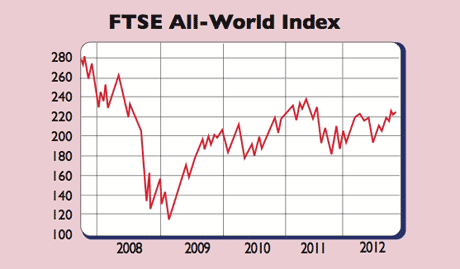
October often makes investors nervous. Both the 1929 and 1987 stockmarket crashes happened in October. What’s more, says James Mackintosh in the FT, in America, which tends to set the tone for world markets, there have been more slides of 10% or more in October than in any other month.
Still, equity investors have been in a good mood of late, with global stocks not far off post-crunch highs after a strong rally in the past few months. Better recent US news has fuelled optimism. The American manufacturing sector expanded for the first time in three months in September. The unemployment rate fell to a near-four-year low of 7.8% last week and the economy added 114,000 jobs in September.
Yet this is very poor progress considering the economy “is already well into the fourth year of steroid-led recovery”, as David Rosenberg of Gluskin Sheff cautions. Compared to past recoveries, the post-credit-crisis rebound remains extremely weak.
It could also be snuffed out altogether if the US economy falls over the ‘fiscal cliff’. There will only be seven weeks after the presidential election for a deeply divided, lame-duck Congress to hammer out a fiscal pact. If they fail, a programme of automatic deep cuts and higher taxes, worth around 4% of GDP, kicks in.
In the meantime, Europe’s recession is deepening, with Germany set to slide under the zero growth line soon. Continual tension between core and periphery is also fuelling uncertainty. Growth in China and emerging markets has turned down.
It’s no wonder, then, that the widely watched Wall Street third-quarter earnings season that started this week is expected to produce the first decline in year-on-year profit growth in 11 quarters. Note too that estimates for 2013 are “way too high”, says Jack Hough in Barron’s, so stocks are vulnerable to disappointment. European estimates also still look too generous, adds Morgan Stanley.
Add all this up, says the FT, and markets look far too complacent and vulnerable to a setback. Chalk that up to “the mind-altering effect of central bank action”: the surge of printed money has created a feel-good factor. But it can’t resolve problems; it merely alleviates symptoms. “Liquidity can calm market nerves against the din of distant skirmishes. It cannot alone fend off the guns trained on our economies.”